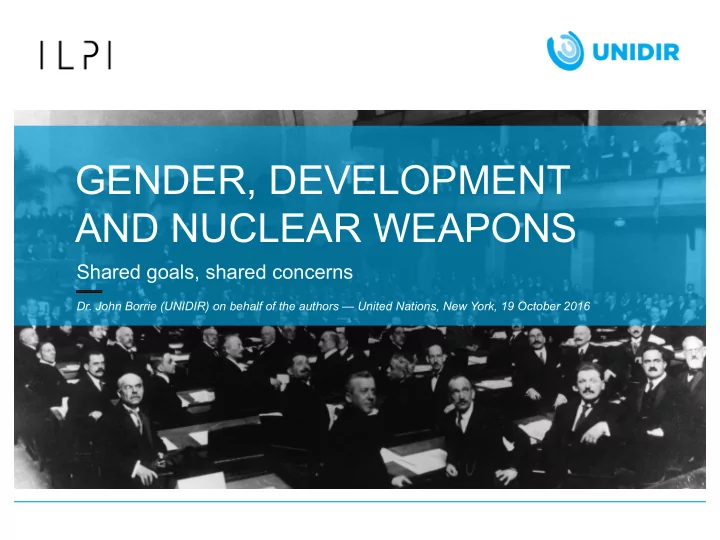

GENDER, DEVELOPMENT AND NUCLEAR WEAPONS Shared goals, shared concerns Dr. John Borrie (UNIDIR) on behalf of the authors — United Nations, New York, 19 October 2016
What this talk is about • ILPI and UNIDIR are interested in nuclear disarmament—including how nuclear weapons are talked about, and who gets to talk about them. • Produced this study, building on previous recent work in this area. • A gender perspective is useful to understanding impact, discourse and actors dealing with nuclear weapons. • Observe there’soften been little connection between efforts in the nuclear weapons domain with other policy areas like those related to sustainable development and gender equality. 2
Summary • Impacts : Nuclear weapon detonations affect women and men differently – biological effects of ionizing radiation – social, economic and psychological impacts of nuclear weapon detonations. • Discourse : Applying a gender lens to the nuclear weapons discourse gives insight into how ideas and policies related to nuclear weapons are gendered. • Representation : In spite of international agreement on the importance of women’s participation in decision-making, there is—still!—a marked gender imbalance in multilateral disarmament forums. • Failure to apply a gender perspective and lack of female participation may be factors contributing to the current lack of nuclear disarmament progress. • This should be of broad concern , because impacts of nuclear detonations would impact on achievement of broader goals, including those gender- related. 3
What is gender? • Gender most often refers to social and cultural differences between male and female … • … as opposed to biological differences ( sex ) • Socially constructed characteristics of masculinity and femininity. – Dynamic; can change over time – Perpetuated by stereotypes and preconceptions, gender roles generate different opportunities and constraints for women and men, girls and boys. • Gender is also an analytical perspective 4
Nuclear weapons, gender and global goals • International community has recognized the links between gender equality, disarmament, peace and security and development in several ways i.e. international frameworks on – Sustainable development, – Human rights – Women, peace and security • … in practice, there’s a long way to go (as we shall see) 5
Gendered impact of nuclear weapon detonations • Affects women and men differently, both in terms of – biological impacts of ionizing radiation; and – gender-specific impacts. • The reverberating impacts of nuclear weapon detonations are gendered. Research indicates that women often are the ones most affected, e.g. in relation to – Psychological impacts, – Displacement, – Social stigma, – Discrimination, – Cultural and indigenous rights 6
Biological impacts: An example (BEIR VII PHASE 2), National Research Council of the National Academies, 2006, p. 284 7
Applying a gender lens to the nuclear weapons discourse • Gives insight into how ideas and policies related to nuclear weapons are gendered (i.e. underpinned by notions of masculinity and femininity). • Contributes to diversifying the debate on nuclear weapons and challenging unjust, established patterns of power relations – Focus on humanitarian impacts, rather than usual nuclear deterrence and non-proliferation centred discourse – Challenging assumed meanings of key concepts such as ’security’, ’disarmament’ and ’proliferation’ that embed nuclear weapons as ’normal’. 8
Gender imbalance in nuclear disarmament forums • Men continue to be heavily over-represented and women under- represented in multilateral forums concerned with security issues, including nuclear weapons. • It’s a pattern that holds true across all United Nations regional groups— though with some variation. • Men’s over-representation/women’s under-representation seems to be even more pronounced in forums concerned with security issues and disarmament than in others (such as the Third Committee). • While women are still seriously under-represented in multilateral forums dealing with security issues, there has been a positive development over the past few decades, with an overall increase of more than 20 percentage points since 1980. Still not enough, though. 9
10
11
12
13
14
15
Why does this matter? • It’s not fair, or equal on the basis of democratic ideals, women’s share of the world’s population, their human rights (as confirmed in int’l standards). – Because of their susceptibility to ionizing radiation effects, and the various gendered impacts of nuclear detonations, it stands to reason women should be more involved in forums dealing with nuclear weapons than in the past. • Women’s exclusion impacts on effectiveness because it inhibits the range of perspective brought to bear on collective problems—perspectives that might not otherwise be placed on the table. – In the broader security context, research has found evidence of positive impacts of women’s inclusion. • Discourse, in other words, is not just about what people say, it is also about who speaks in the first place. – This shapes the discourse, making particular acts more or less thinkable, and also empowering or disempowering certain interlocutors. 16
17
Concluding points • The use of nuclear weapons affects women and men differently, both in terms of the biological impacts of ionizing radiation and gender-specific impacts. • Applying a gender lens to the nuclear weapons discourse gives insight into how ideas and policies related to nuclear weapons are gendered. • In spite of international agreement on the importance of women’s participation in decision-making, there is a gender imbalance in multilateral disarmament forums. We have some way to go, and correcting this imbalance should be regarded as an integral part of nuclear disarmament efforts. • Lack of gender analysis and inclusion of female stakeholders may help to explain the current lack of nuclear disarmament progress, and why other agreements to tackle global problems seem to be so often ignored or contradicted in the prevailing policy discourse on nuclear weapons at the international level. 18
Download the report • unidir.org • wmd.ilpi.org • effectivemeasures.org (an ILPI- UNIDIR blog site) • Can also download a range of other nuclear disarmament resources for free at these URLS. 19
Recommend
More recommend